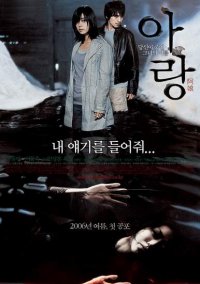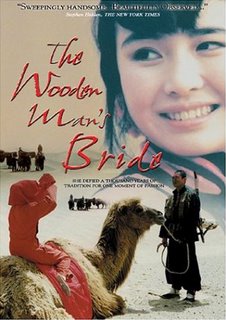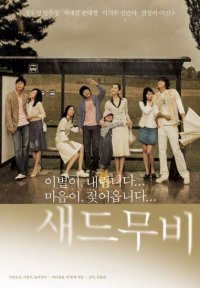 Strange Circus is a mind blower. Directed by Sion Sono, the man who is known for his US distributed film Suicide Circle, he has put forth another solid effort that will disturb and shock. It is a film filled with dreamlike imagery, dual roles, sex, violence, and decadent posturing, all centering around a Japanese family that has gone way beyond nuclear. Misumi Miyazaki puts in a stellar performance as the wife of a wealthy man who is, to put it mildly, oversexed. She shares his passions, but their exuberant lovemaking stirs Matsuko, their young daughter, to peek into the bedroom to see what is going on. She slips away, but the father sensed someone watching them, and figured it was her. He molests her after she brings a bad report card, thus beginning a downward spiral into abuse and madness for the child. He forces her into a cello, where she sees her parents making violent love through a hole in the case. He has sex with her in secret. Eventually the mother finds out, but instead of leaving her husband, becomes sexual rivals with her daughter as they both service his insatiable needs. Both mother and daughter lose their grip on reality; Matsuko can not distinguish herself from her mother, and sees them as one and the same, especially in bed; the mother begins to abuse the child as an outlet for her anger and helplessness. In a quarrel involving a lost pearl earring, Matsuko pushes her mother down the stairs and kills her. The movie then changes to Taeko, also played by Miyazaki, a novellist bound to a wheelchair, and having a taste for decadence, as shown by her workplace and the men that are around her. A newcomer to the circle arrives, a young effeminate man named Yuji, hired by Taeko to be her assistant. He takes her to various places for writing inspiration and just for company. Yuji finds out that Taeko is not who she seems to be -- she has no need for the wheelchair, that she can walk, and that the novel that she is writing -- which is the mother/daughter story shown earlier. Is Taeko actually Matsuko? Yuji is asked by Taeko's associates to investigate further for their own tabloid papers, and he agrees, but for a different reason. Yuji becomes part of a group of people who have done self mutilation, and the reason for his inclusion becomes known later. Taeko is clearly an unbalanced woman, finishing Matsuko's tale -- Matsuko tries to kill herself but fails, and ends up in a wheelchair. No longer a viable sexual outlet, her father takes up with a group of younger women, screwing them around the house, ignoring her daughter. Taeko has nightmares that refers to a more personal experience relating to her novel, dreaming of herself in the wheelchair, of having sex with her father, etc. And she has a cello case with her in a locked room that she talks to. Yuji puts the pieces together, and calls Taeko to inform her that he has the thing inside the cello and has brought it to the old house, which is the house referred to in the book. Taeko arrives, and Yuji confronts her, saying that he knows all, and asks if she is so demented that she can't recognize who he really is. Taeko is confused, until Yuji reveals his chest, which shows scars where there were once breasts. Yuji is Matsuko! And Taeko is the mom, surviving only by putting herself in a state of denial, and thinking that she was her daughter, killing herself in her mind. Matsuko was the one who was pushed down the stairs, and almost died. But she was brought to the hospital, and there officials detected child molestation, and had her removed from the parents and placed into a foster home. But Matsuko was never well mentally, and removed whatever obvious signs of femininity to remove herself from her past. Matsuko brings her mother up to the bedroom, where her husband, still alive, limbless, is twitching on the bed, a big bloody stump. Matsuko goes insane, and chains her mom to the bed, as her daughter brings out a chainsaw, ready to remove her own limbs, to bring about the conclusion of Taeko's novel, father and mother in bed limbless.
Strange Circus is a mind blower. Directed by Sion Sono, the man who is known for his US distributed film Suicide Circle, he has put forth another solid effort that will disturb and shock. It is a film filled with dreamlike imagery, dual roles, sex, violence, and decadent posturing, all centering around a Japanese family that has gone way beyond nuclear. Misumi Miyazaki puts in a stellar performance as the wife of a wealthy man who is, to put it mildly, oversexed. She shares his passions, but their exuberant lovemaking stirs Matsuko, their young daughter, to peek into the bedroom to see what is going on. She slips away, but the father sensed someone watching them, and figured it was her. He molests her after she brings a bad report card, thus beginning a downward spiral into abuse and madness for the child. He forces her into a cello, where she sees her parents making violent love through a hole in the case. He has sex with her in secret. Eventually the mother finds out, but instead of leaving her husband, becomes sexual rivals with her daughter as they both service his insatiable needs. Both mother and daughter lose their grip on reality; Matsuko can not distinguish herself from her mother, and sees them as one and the same, especially in bed; the mother begins to abuse the child as an outlet for her anger and helplessness. In a quarrel involving a lost pearl earring, Matsuko pushes her mother down the stairs and kills her. The movie then changes to Taeko, also played by Miyazaki, a novellist bound to a wheelchair, and having a taste for decadence, as shown by her workplace and the men that are around her. A newcomer to the circle arrives, a young effeminate man named Yuji, hired by Taeko to be her assistant. He takes her to various places for writing inspiration and just for company. Yuji finds out that Taeko is not who she seems to be -- she has no need for the wheelchair, that she can walk, and that the novel that she is writing -- which is the mother/daughter story shown earlier. Is Taeko actually Matsuko? Yuji is asked by Taeko's associates to investigate further for their own tabloid papers, and he agrees, but for a different reason. Yuji becomes part of a group of people who have done self mutilation, and the reason for his inclusion becomes known later. Taeko is clearly an unbalanced woman, finishing Matsuko's tale -- Matsuko tries to kill herself but fails, and ends up in a wheelchair. No longer a viable sexual outlet, her father takes up with a group of younger women, screwing them around the house, ignoring her daughter. Taeko has nightmares that refers to a more personal experience relating to her novel, dreaming of herself in the wheelchair, of having sex with her father, etc. And she has a cello case with her in a locked room that she talks to. Yuji puts the pieces together, and calls Taeko to inform her that he has the thing inside the cello and has brought it to the old house, which is the house referred to in the book. Taeko arrives, and Yuji confronts her, saying that he knows all, and asks if she is so demented that she can't recognize who he really is. Taeko is confused, until Yuji reveals his chest, which shows scars where there were once breasts. Yuji is Matsuko! And Taeko is the mom, surviving only by putting herself in a state of denial, and thinking that she was her daughter, killing herself in her mind. Matsuko was the one who was pushed down the stairs, and almost died. But she was brought to the hospital, and there officials detected child molestation, and had her removed from the parents and placed into a foster home. But Matsuko was never well mentally, and removed whatever obvious signs of femininity to remove herself from her past. Matsuko brings her mother up to the bedroom, where her husband, still alive, limbless, is twitching on the bed, a big bloody stump. Matsuko goes insane, and chains her mom to the bed, as her daughter brings out a chainsaw, ready to remove her own limbs, to bring about the conclusion of Taeko's novel, father and mother in bed limbless.Not your average film. While the over-the-top conclusion is messy, and the incestuous storyline hard to watch, it is compensated by an excellent directorial effort by Sion Sono, who is also a poet and is well known in Japan for his performance pieces. He reminds me of Jodorowsky and his circle from the late 60's to early 70's -- the films like El Topo, Alucarda, Mansion of Madness, and the later film Santa Sangre all are excellent works that exemplify the "art" film, where reality gives way to the surreal, and the poetry of images takes precedence rather than logic or meaning. But even art films have their own story, their own logic, just as abstractions and conceptual pieces in the art world, and it is the viewer's job, should he or she take it, to experience the piece and come to a conclusion. Does this film succeed? Absolutely yes! The visuals, and the story are well done, intelligent and creative. I think the film does lose marks for the ending, where it seems Sono is trying to outdo Takashi Miike, with it's hysterics. Part of it may have to do with the uneven acting of Issei Ishida, who plays Yuji, where for most of the film he is quiet and laid back. At the end he is laughing maniacally and screaming, but overdoing it. And the story is tied up a bit too neatly by the violent ending, a purge for the daughter as well as the mother, which, compared to the rest of the film, seems conventional. This will be a hot film to watch for those who love the outre or psychotronic movies; all others should find something more pleasant to watch. I think this is an extremely well made and disturbing film, despite the subject matter.











